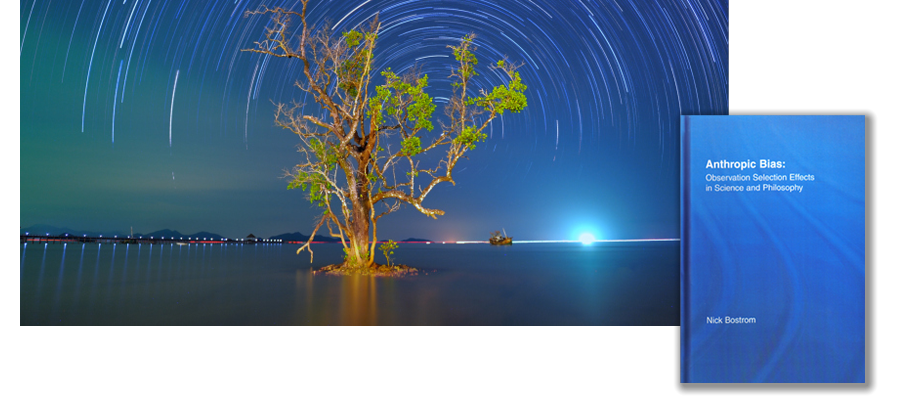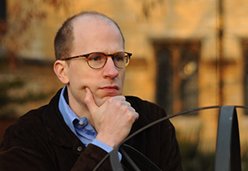Papers related to the Anthropic Principle by Nick Bostrom
- Anthropic Shadow: Observation Selection Effects and Human Extinction Risks
- "Anthropic shadow" is an observation selection effect that prevent observers from observing certain kinds of catastrophes in their recent geological and evolutionary past. We risk underestimating the risk of catastrophe types that lie in this shadow. (w/ Milan Cirkovic & Anders Sandberg) [Risk Analysis, Vol. 30, No. 10 (2010): 1495-1506] [Won best paper of the year award by the journal editors] [translation: Russian] [pdf]
- Where Are They?: Why I hope the search for extraterrestrial life finds nothing
- [MIT Technology Review, May/June issue (2008): pp. 72-77] [pdf]
- Observation Selection Effects, Measures, and Infinite Spacetimes
- An advanced Introduction to observation selection theory and its application to the cosmological fine-tuning problem [Universe or Multiverse?, ed. Bernard Carr (Cambridge University Press, 2007)] [pdf]
- Sleeping Beauty and Self-Location: A Hybrid Model
- The Sleeping Beauty problem is an important test stone for theories about self-locating belief. I argue against both the traditional views on this problem and propose a new synthetic approach. [Synthese, Vol. 157, No. 1 (2007): 59-78] [pdf]
- The Mysteries of Self-Locating Belief and Anthropic Reasoning
- Summary of some of the difficulties that a theory of observation selection effects faces and sketch of a solution. [Harvard Review of Philosophy, Vol. 11, Spring (2003): 59-74] [pdf]
- The Doomsday argument and the Self-Indication Assumption: Reply to Olum
- Argues against Olum and the Self-Indication Assumption. [Philosophical Quarterly, Vol. 53, No. 210 (2003): 83-91] [w/ Milan Cirkovic] [pdf]
- Beyond the Doomsday Argument: Reply to Sowers and Further Remarks
- Argues against George Sower's refutation of the doomsday argument, and outlines what I think is the real flaw. [pdf]
- Self-Locating Belief in Big Worlds: Cosmology's Missing Link to Observation
- Current cosmological theories say that the world is so big that all possible observations are in fact made. But then, how can such theories be tested? What could count as negative evidence? To answer that, we need to consider observation selection effects. [Journal of Philosophy, Vol. 99, No. 12 (2002): 607-623] [html] [pdf]
- The Doomsday Argument, Adam & Eve, UN++, and Quantum Joe
- On the Doomsday argument and related paradoxes. [Synthese, Vol. 127, No. 3 (2001): 359-387] [html] [pdf]
- A Primer on the Doomsday Argument
- The Doomsday argument purports to prove, from basic probability theory and a few seemingly innocuous empirical premises, that the risk that our species will go extinct soon is much greater than previously thought. My view is that the Doomsday argument is inconclusive - although not for any trivial reason. In my book, I argued that a theory of observation selection effects is needed to explain where it goes wrong. [Colloquia Manilana (PDCIS), Vol. 7 (1999); reprinted in The Actuary, March (2001), and on ephilosopher.com, (2001)] [translations: Russian]
- Cars In the Other Lane Really Do Go Faster
- When driving on the motorway, have you ever wondered about (and cursed!) the fact that cars in the other lane seem to be getting ahead faster than you? One might be tempted to account for this by invoking Murphy's Law ("If anything can go wrong, it will", discovered by Edward A. Murphy, Jr, in 1949). But there is an alternative explanation, based on observational selection effects... PLUS, No. 17 (2001)]
- Observer-relative chances in anthropic reasoning?
- A paradoxical thought experiment [Erkenntnis, Vol. 52 (2000): 93-108]
- Cosmological Constant and the Final Anthropic Hypothesis
- Examines the implications of recent evidence for a cosmological constant for the prospects of indefinite information processing in the multiverse. Co-authored with Milan M. Cirkovic. [Astrophysics and Space Science, Vol. 279, No. 4 (2000): 675-687] [pdf]
- The Doomsday Argument is Alive and Kicking
- Have Korb and Oliver refuted the doomsday argument? No. [Mind, Vol.108, No.431 (1999): 539-550] [translations: Russian]

